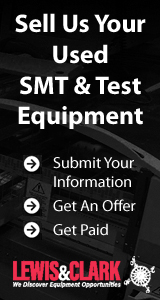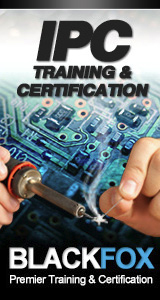Following the European Union s recent agreement on the Restriction of Hazardous Substances in Electrical and Electronic Equipment Directive, all affected electrical equipment that is sold in Europe after July 1, 2006, must be free of lead. Although this ban is set to take place only in Europe, rising global public and political pressure against lead will force international OEMs to push their suppliers to develop preparatory plans.
Through the co-sponsored conference, entitled Towards Implementation of the RHS Directive, IPC and SOLDERTEC will assemble elite industry experts for a two-day technical conference and a variety of educational courses and workshops focused on helping these affected suppliers, assemblers and retailers prepare for the inevitable ban on lead.
Currently, IPC and SOLDERTEC are seeking technical conference paper submissions covering the following topics:
� European/other legislation on hazardous materials and recycling, policy enforcement, etc.
� Summary of voluntary implementation/legislation/research in other regions (U.S., Japan, China, Taiwan, etc.)
� Design issues for ease of production and disassembly
� PCB issues the effects of lead-free process temperatures, board finishes, etc.
� Component issues the effects of lead-free process temperatures, BGAs, obsolescence, etc.
� New finishes (plating technology, solderability and tin whiskering)
� Comparisons of solder alloys mainstream (e.g. SnAgCu / SnCu) and specialist (e.g. SnZnAl) compositions
� Alternative means of substitution (conductive adhesives, etc.)
� Lead free manufacturing examples of implementation, process considerations, inspection, etc.)
� Repair and rework (process control, mixed alloy systems, etc.)
� Reliability evaluations (research, product test and in-service, including new test methods)
� Lead free and other product sectors (automotive, aerospace, etc.)
� Environmental considerations and studies (material availability, toxicity issues, etc.)
� Recycling (examples, plans and concerns)
� Business issues (supply chains, cost-benefit analysis, etc.)
The conference will offer 30- to 45-minute time slots for papers and presentations in both forum or panel discussion formats. A brief biography and an abstract, which should be approximately 200-300 words long, must be received by April 2, 2003. If an abstract is accepted, the deadline for paper submissions will be May 5, 2003.
Presentation materials and papers should be noncommercial in nature, focusing on technology rather than a company s product. To deliver an oral presentation, it is mandatory to provide a print-quality paper or hard copies of visuals for the conference proceedings. Previously published papers and papers focused on a company s products will not be accepted.
In addition, IPC and SOLDERTEC are seeking proposals from those interested in teaching six-hour tutorials or three-hour workshops on relevant lead free topics, such as reliability, process issues, rework, plating and surface finishes, design for lead-free and design for recycling. A brief description on any such proposals should be submitted according to the aforementioned guidelines for abstract submissions.
Companies are also invited to showcase their products and services. For more information about sponsorship opportunities or reserving tabletop exhibit space, contact Alexandra Curtis, IPC s continuing education manager, at AlexandraCurtis@ipc.org or 847-790-5377.
For more information about the International Conference on Lead-Free Electronics, visit http://www.ipc.org/html/CFPLFBrussels.pdf, e-mail BrusselsLF@ipc.org or contact Joe Dudeck, IPC s communications manager, at JoeDudeck@ipc.org or 847-790-5371.
 »
»





